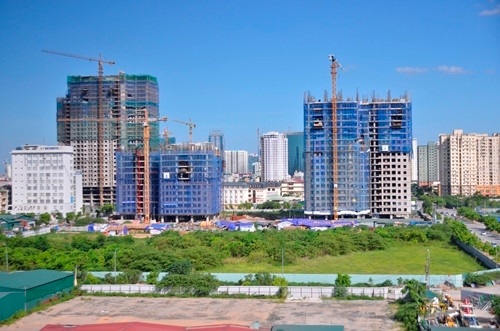Hanoi (VNA) - Experts have said it is necessary for the real estate sector to find stable financial sources to ensure adequate housing supply as demand was anticipated to pick up rapidly.
Even though the Vietnamese economy was entering a new growth circle and the property market was on the recovery path this year, limited funding has turned into a barrier, experts agreed at a conference jointly held by the Vietnam Real Estate Association and Lao Dong (Labour) Newspaper on March 23 in Hanoi.
Le Xuan Nghia, Director of the Business Development Institute, said that initial research, which took the impact of the Trans-Pacific Partnership (TPP) into account, found that the property market might narrow down the excess and supply over demand and reach a balanced status in 2018.
From 2019, there would be a shortage of housing in big cities as around three million people would move from rural areas to cities, plus dozens of thousands of foreigners would enter the country as an impact of TPP, Nghia said. “The property market might be overheated from as early as 2021.”
“Tightening credits of the real estate sector is not a good idea at this moment,” Nghia said, and added that the current situation was different from what prevailed in 2006, when a bubble was formed, which burst two years later. “Instead, the credit flow into the property sector should be put into better management.”
The monetary policy should be loosened reasonably to keep interest rates stable to support the recovery of the property market which was closely attached to the financial market with 70 percent of banking credits being real estate assets, according to Nghia.
Finding stable capital sources for property development has become a matter of concern now that demand might surpass supply in the next few years if no improvements were made to improve supply, the association’s president Nguyen Tran Nam said.
Funding sources
In developed countries, sources of capital for the property market were abundant. They came from banks, investment funds, real estate investment trusts, and pension funds, apart from foreign direct investment (FDI) and indirect investment (FFI). In comparison, in Vietnam, the property sector largely relied on banks and buyers for funding.
Property expert Dang Hung Vo said at the conference that the property market had not created a stable capital inflow while equity capital of property firms was limited. The capital from banking credits had high interest rates and were vulnerable to ups and downs of the financial market due to the shortage of long-term capitals, he said.
The property market was on a recovery path, and it offered great opportunities for the securitisation of investments in the sector while Vietnam had the legal framework for such securitisation, he said.
Vo urged local investors to launch property investment funds to operate in the security market, which would help generate capital for the property sector.
In addition, Vo proposed that Vietnamese property assets be allowed as mortgages at foreign banks to pave the way for accessing medium and long-term capitals from banks with huge financial capacity. The current legal system did not allow this.
“When access to land is easy, access to capital is easy and borrowing costs are low, can property prices be lowered?” Vo asked.
Nguyen Trong Du from the State Bank of Vietnam said that the central bank’s policies would avoid sudden adjustments to ensure that policies supported the market as it was important to the economy.
The central bank wanted commercial banks to be healthier but did not mean to ask banks to cut leadings for the property sector, Du said.
According to Nguyen Quoc Hiep, Chairman of GP Invest, the crossholdings between commercial banks and property developers should be limited, while the central bank must closely monitor credit inflows to property projects.
Speaking at the conference, Vu Van Phan, Deputy Director of the Construction Ministry’s Department of Housing and Real Estate Market Management, said that the close management of credit flow into the property sector was necessary to ensure capital efficiency and the firm recovery of the market while preventing shocks which might badly affect the economy.-VNA




























